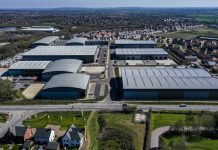Birmingham-based Real Estate Investors plc has reported a year of continuing growth on all fronts in its results to 31 December 2018.
Underlying profit before tax was up 16.1% to £7.2 million from £6.2 million in 2017 reflecting a year of strong office occupier demand and rental growth with occupancy standing at 96% (2017 – 92.8%).
Contracted rental income was up 4.9% to £17 million from £16.2 million. The company has reduced its average cost of debt to 3.7% with 67% of debt fixed and conservative loan-to-value gearing at 39%.
REI’s dividend rises for the sixth consecutive year – up 14% on 2017.
Chief executive officer Paul Bassi said REI was alert to opportunities to snap up mis-priced assets where overly negative sentiment towards the high street, or Brexit nervousness, is creating buying opportunities.
REI can currently call on £25 million of cash and facilities for opportunistic transactions, with further headroom available if required.
The company has identified 250,000 sq ft within its portfolio of permitted development opportunities for conversion to residential.
The first of such residential conversion value creation opportunities was the sale of offices at Citygate House, Leicester, which was sold with permitted development rights for £2.6 million and is due to complete in June 2019, representing a 40% uplift to the December 2017 book value.
Paul Bassi said: “In addition, the 2018 results do not include residential planning consent for approximately 100 units in Coseley, which is expected to be sold to a residential developer for significantly more than existing book value.”
He said the results for 2018 reflected the gathering pace of work on HS2, population migration from London and refocusing of investors on the regions, driving increased value in asset classes around Birmingham and the wider Midlands.
“Our main objectives for the year were to continue to increase shareholder value, refinance unencumbered properties and deploy the funds generated in criteria compliant investment properties, continue our progressive dividend policy, and increase our underlying profit before tax, EPRA earnings per share and net assets per share.
“All of these objectives have been achieved.
“These are a good set of results, showing growth in our underlying profits and dividends underpinned by a portfolio now being valued at £224.8 million.
“In 2019, we expect to continue to prosper from the popularity of Birmingham and the wider Midlands, as the region’s economy benefits from the arrival of HS2, Coventry City of Culture 2021 and Commonwealth Games 2022.
“We anticipate seeing off-market opportunities on the back of the current financial and political volatility. We welcome these periods of uncertainty, as they often bring mis-priced assets to the market which, with our local expertise and financial strength, we can move quickly to capitalise on.
“Our portfolio is balanced, has the necessary depth for us to continue to generate value through intensive asset management activities and, together with positive tail winds from the substantial investment coming into the region, REI is well-placed to prosper further.”
During the year, REI completed £15.4 million of investment property acquisitions (net of acquisition costs) and £5.7 million of strategic sales.
The portfolio is valued at £224.8 million (2017: £213.1 million), an increase of 5.5% and contracted rental income has grown to £17 million p.a. (2017: £16.2 million p.a.), up 4.9%. The company’s property portfolio currently comprises 1.55 million sq ft of commercial property including 52 assets with 269 tenants and a net initial yield of 7.26%.
Mr Bassi added: “Our portfolio is strategically well positioned across the Midlands region and, despite a highly competitive investment market, we have acquired a variety of high yielding, quality investment assets during the period.”
“Overall, the Midlands property market is positive with pockets where it is buoyant. Currently demand is especially strong for out of town areas such as Solihull and the M42 corridor for which vacancy rate has reached a 10-year low. These conditions suit REI as they require local knowledge with which to flourish.”






















